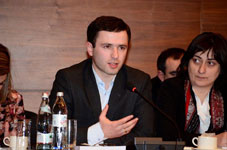
Conference in Tbilisi focuses on the Georgian electoral reform
By Salome Modebadze
Friday, February 14
Representatives of the Georgian government, civil society, and international organizations discussed recommendations made in the final report by the OSCE Office for Democratic Institutions and Human Rights (ODIHR) on the 2013 presidential elections and on future steps in reforming electoral legislation.
The conference organized by the United Nations Development Programme (UNDP) and ODIHR, with assistance from the European Union (EU) was held at the Radisson Blu Iveria Hotel on 13 February.
Niels Scott, Head of the UNDP in Georgia, Donald Bisson, Deputy Head of the OSCE/ODIHR election observation mission for the 2013 presidential election, Ambassador Philip Dimitrov, Head of the EU Delegation to Georgia, and Manana Kobakhidze, First Deputy Chairperson of the Georgian Parliament, addressed the participants at the opening session.
Calling last year’s presidential elections “successful,” Scott said it is necessary to keep the same pace in the future. He said effective electoral legislation is the only way to agree on the rules of the game, and provide a “level playing field” for all, both in terms of the technical process and overall election environment.
“We welcome the readiness of Georgian national institutions to jointly move forward for the successful completion of the reform. The comprehensive electoral legislation will be a decisive step to building confidence among the players and promoting integrity of the electoral process,” Scott said, stressing the necessity for addressing remaining challenges and making ongoing reform successful, especially in view of the coming local elections in 2014.
First Deputy Chairperson of the Georgian Parliament spoke about the priorities and further steps of the election legislation reform from the perspective of legislators. Kobakhidze said the issue of making the election environment healthier is on the agenda. However, she is suspicious that anything may change concerning the proposed threshold.
The threshold for electing mayors in twelve cities and gamgebelis, or regional governors, of dozens of municipalities across the country has been among the most debated issues in Georgia for the last several months as the local elections are approaching.
The Georgian Dream administration has proposed setting no less than a 40% threshold for declaring an outright winner of the race without needing a runoff. However, non-parliamentary opposition parties insist on having a 50% threshold.
Now Tbilisi is the only city where the mayor is elected directly and the threshold is currently set at 30%. Georgian Dream wants to set a 33% threshold for the election of gamgebelis.
The representative of the non-parliamentary opposition, Jondi Baghaturia, said that if an agreement is not reached with the government, elections will not be conducted in a fair and competitive environment.
The United National Movement Parliamentary Minister, Chiora Taktakishvili, claimed that representatives of the local governments are being detained at the regions where Georgian Dream could not gather enough votes at the 2012 parliamentary elections to discredit the UNM before the forthcoming elections.
Heads of the Georgian Young Lawyers’ Association, ISFED and Transparency International - Georgia shared joint recommendations. Head of the GYLA, Kakha Kozhoridze, later stated that the independent candidates should not be deprived of the right to participate in the election race for mayors and regional governors because otherwise they will have to join certain political parties, which can be considered as a step back.
Thursday’s event brought together representatives of the Georgian Parliament, the Ministry of Justice, the Central Electoral Commission, the State Audit Office and the Georgian National Communications Commission (GNCC), as well as from political parties, civil society organizations, international agencies, and diplomatic missions.


